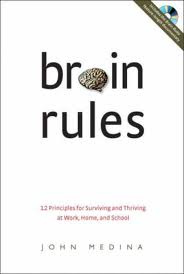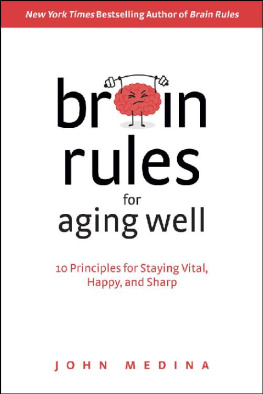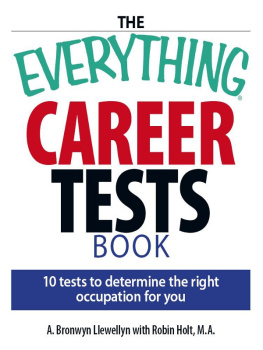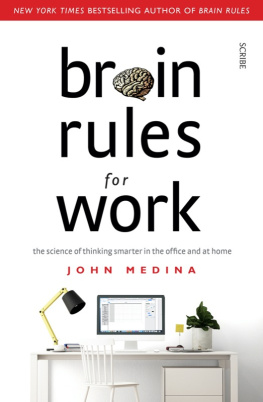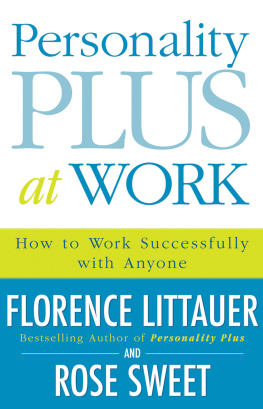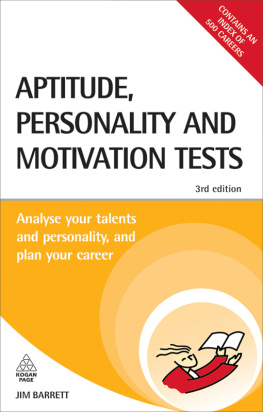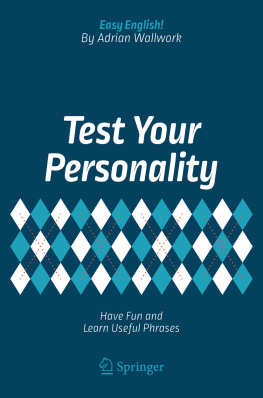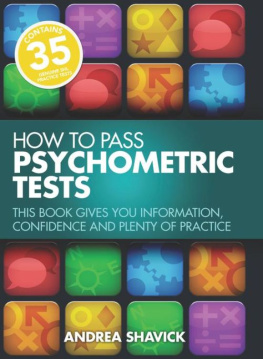Contents
Page List
Guide


PERSONALITY. Copyright 2021 by John J. Medina.
All rights reserved. Printed in the United States of America. No part of this book may be used or reproduced in any manner whatsoever without written permission except in the case of brief quotations embodied in critical articles or reviews. Requests for permission should be addressed to:
Pear Press
P.O. Box 70525
Seattle, WA 98127-0525
USA
This book may be purchased for educational, business, or sales promotional use. For information, please visit www.pearpress.com.
FIRST EDITION
Edited by Erik Evenson
Designed by Greg Pearson
Library of Congress Cataloging-in-Publication Data is available upon request.
ISBN 978-1-7370728-5-0
10 9 8 7 6 5 4 3 2 1
Printed in the United States of America
Contents
personality
Brain Rule:
Personality tests, like chocolate, should be taken with a grain of salt.
WHEN SOME PEOPLE HEAR the name John Madden, theyre reminded of a bestselling videogame. Others remember an insightful, riotously funny football broadcaster, famous for saying things like Boom! You got this guy going here, this guy going there, this guy going that way, thenboom! But football fans of a certain ageyou know who you arehave a much richer store of memories of the man. Madden was one of the greatest coaches ever to head a football team. He had an outsize, charismatic personality, nearly as big as his belly. He needed every ounce of it to shape an unruly, headstrong group of football players into a winning team.
Madden helmed the Oakland Raiders from 1969 to 1978. His teams secured numerous division championships and went on to win one Super Bowl. Incredibly, he never had a losing season. (To this day, Madden is the winningest coach in Raiders history).
His success was hardly a walk in the park, though. Maddens Raiders often seemed like they were recruited from the Island of Misfit Toys. Many players were dropped from other teams around the league. Consider some of their nicknames: Snake, The Mad Stork, The Assassin, Rooster, and Dr. Death. During training camp, one player showed up on the 50-yard line atop a horse wearing a traffic cone on his head. Madden once quipped, The road to easy street goes through the sewer. Perhaps he meant the horse corral.
Not just anybody could have gotten the 1970s Raiders to play as a cohesive unit. Indeed, Oakland went through five head coaches in eight years before they found Madden. They could have saved a lot of money if they possessed some magic crystal ball capable of predicting the right person for the job.
Do such crystal balls exist? Many businesses have complex management needs every bit as challenging as the 1970s Raiders. Most dont have a John Madden. What traits did Johns personality have to make him such an effective coach?
Knowing how the personalities of employees affect an organizations success would be extremely useful, especially if youre faced with the daunting task of staffing your team, your department, your company. Many businesses use personality tests in an attempt to forecast peoples occupational successes. Are any of them worth using? The answer is a qualified yes, depending upon the tests you use and the people you employee to help you interpret them. Im not yet ready to turn formal personality testing into a crystal ball. I am, however, ready to nominate responsible testing for a spot on your hiring committee.
Well look at some of these tests, from present-day questionnaires to future-day genetic testing. Well talk about how to measure the messy business of human behavior, discussing variables about which researchers are reasonably wary. But before we get started, I need to discuss three factors that frame what personality tests can and cant do for your hiring practices.
Three factors
The first factor concerns an end-point definition: Exactly what is meant by a companys success? Its often defined comprehensively as the satisfactory completion of a goal.
But is this definition really all that comprehensive? Businesses often cite factual measures to assess successcash flow and profitability come to mind. Maddens metrics were certainly measurablefootball is basted in statistics. Yet hed be the first to admit that objective measures arent the only important factors out there. Subjective achievements, from feelings of accomplishment and security to interpersonal development and professional comity, should also be considered successes. Making the world a better place could certainly function as a measure of success, though its not always easily definable. Well stick with the idea of achieving a goal here, but not because its all-encompassing.
The second factor concerns the role personality plays in achieving success. Im going to give a full-throated psychological definition of personality shortly. (Spoiler alert: its surprisingly controversial.) But even if there were universal agreement about the definition, certain personality tests make assumptions that leave me scratching my head. Some assume personality is the primaryin some cases the onlyaspect of behavior that matters to business success. Is that true? Might there be other dimensions of behavior equally important to achievement? Do we focus on personality simply because weve devised convenient (and in some cases, profitable) ways to measure it?
The final factor is something I call the Weather Channel problem. I love the Weather Channel, in part because of its mission: its valuable broadcasts are shouldered with the task of predicting the future. Yet one of the most noticeable things about their forecasts is that they are filled with uncertainty. Thats because theyre often wrong. There are so many models used to predict the path of a hurricane, for example, with so little precise agreement, theyre often called spaghetti models. (Thats because the predicted paths generated by various computer models look like noodles of spaghetti thrown against a map.)
The forecasting technologies are getting better, to the point where thousands of peoples lives are routinely saved because of them. But even with gazillions of satellites and some of the strongest computing power in the world, they are yet to be 100% reliable.
Like the weather, human behavior is messy. Given this turbulence, you might guess that attempting to forecast occupational success based on behavioral tests is just as fraught with uncertainty. And youd be right. Personality tests are notoriously unpredictable, a fact you can actually measure. In a few pages, Ill show you how.
Happily, a few personality tests are getting better at forecasting. Like I said, some deserve a place at the employment decision table. Well take a look at which ones do and dont, as well as why. Just keep in mind that personality tests are prone to the same spaghetti noodling as weather patterns and have just as far to go before they become reliably prophetic. Also keep in mind that, despite not being 100% predictive, forecasts can be useful: I still check the Weather Channel to tell me whether I can expect rain or sunshine tomorrow, despite the statistical pasta.
Personality definitions
So what personality tests work?
We begin our discussion by describing what researchers know about personality. You can divide this slice of psychological science into roughly



